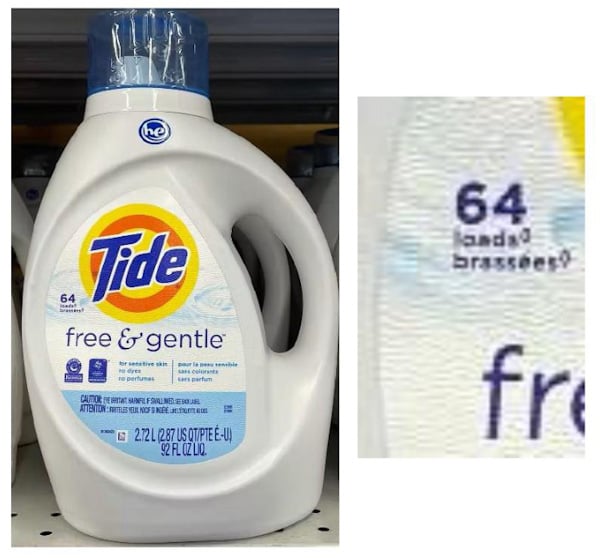Does Tide mislead consumers with '64 loads' claim? Judge thinks not

The term “load” is ambiguous, said U.S. District Judge Cathy Seibel of New York in her Jan. 2 decision. The judge noted that there is a diamond after the word “loads,” leading to more information on the back label. Photos from Seibel’s decision.
A federal judge in New York criticized consumer lawyer Spencer Sheehan as she tossed his proposed class action lawsuit claiming that Tide misleads consumers with labels promising to wash “64 loads.”
U.S. District Judge Cathy Seibel of the Southern District of New York on Tuesday dismissed the amended suit by plaintiff Aja Adeghe, who said the Tide laundry detergent that she bought did not contain enough detergent for 64 full-size loads. In reality, Adeghe alleged, there is only enough Tide for 32 full-size loads.
Law360 has coverage.
The term “load” is ambiguous, Seibel said in her Jan. 2 decision. The judge noted that there is a diamond after the word “loads,” leading to more information on the back label. At that location, Tide discloses that 64 loads refers to 64 medium loads, as measured by the lowest bar on the cap.
Adeghe had sued for alleged violations of New York business law, state consumer fraud laws, breach of warranty and unjust enrichment. Seibel tossed all the claims and refused to allow Adeghe to file an amended suit.
Seibel said Sheehan, one of the lawyers representing Adeghe, “regularly brings such claims and then withdraws them” after a motion to dismiss is filed.
“The court again questions how counsel can continue to bring such claims in good faith, as he plainly knows he will be unable to justify them,” Seibel wrote.
Referencing prior suits, Seibel said Sheehan “continues to plead in an insufficient fashion, when a modicum of legal research would avoid the problem.”
At the conclusion of her opinion, Seibel quoted with approval from a decision by a federal judge in the Northern District of New York.
That judge said: “Courts around the country have been inundated with a seemingly endless supply of trivial (bordering on frivolous) lawsuits, asking the courts to read the labels of consumer goods in manners that strain credulity or to simply ignore other relevant language provided on the labels. The case before the court here is one of many that should give pause to Mr. Sheehan and serve as a reminder that context matters and that a label should be read in its entirety.”
Sheehan didn’t immediately reply to an ABA Journal email and voicemail seeking comment.
See also:
“Food Fight: Do lawsuits challenging product labels benefit consumers?”
“Food labeling lawyer’s ‘warehouse of complaints’ are ‘not fit for public consumption,’ judge says”
“Lawyer has filed nearly 100 consumer lawsuits over vanilla labeling”
Write a letter to the editor, share a story tip or update, or report an error.



